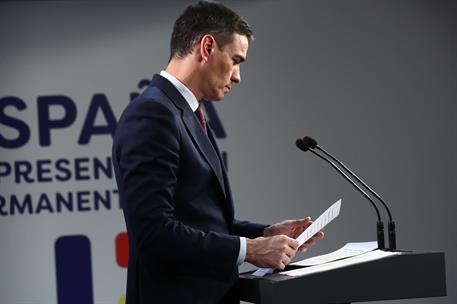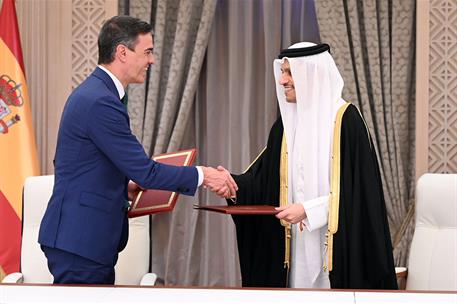Appearance in the Lower House of Parliament
Pedro Sánchez: "Today's Spain is a major international player"
President's News - 2024.4.10
Lower House of Parliament, Madrid
The President of the Government of Spain during his appearance in the Lower House of Parliament (Pool Congreso)
At his request, Pedro Sánchez appeared in the Lower House of Parliament to report on the European Council held on 21 and 22 March and, at the request of the Popular Group, to give an account of how his latest official trip to Morocco was organised.
During his speech, the head of the Executive reviewed the Government's geopolitical and macroeconomic strategy, whose purpose, he said, is to face the dual challenge of strengthening the EU's peace project and Spain's economic competitiveness.
In this context, Sánchez stressed that in recent months he has met with the leaders of 35 countries around Spain in search of "more security and prosperity" for citizens. "Today's Spain is not content to be a mere international observer; it is a major player," said Sánchez.
Foreign policy in Ukraine, the Middle East and North Africa
In his speech, Sánchez reviewed the repercussions of the Russian invasion of Ukraine, the situation in Syria, the war in Gaza and the instability in the Sahel, a geopolitical reality in the face of which, according to the president, the government has deployed an "ambitious and coherent" foreign policy.
According to Pedro Sánchez, this is a "committed and supportive" external action, which "is helping the different regions, raising Spain's international profile, strengthening our pro-European and multilateralist profile, and contributing to the security and economic growth of our country".
In this context, the leader of the Executive stressed that his Government demanded a ceasefire in the Gaza Strip in Brussels from the outset, proposed the holding of an international peace conference and defended the two-state solution, a position that has been endorsed by most member states. "The international community will not be able to help the Palestinian state if it does not first recognise its existence", said Sánchez, who recalled the new tour of contacts that he will launch this week to work on this issue and stressed that "Spain is prepared to recognise the Palestinian state".
Actions in Maghreb and Sahel
In relation to the "southern neighbourhood", the Maghreb and the Sahel, Sánchez stressed that in recent months Spain has supported the signing of strategic EU agreements with Tunisia and Egypt; it has persuaded the European Commission to invest in Mauritania, and has strengthened police, financial and financial and business collaboration with Morocco, taking advantage of the official visit in February.
He also highlighted that Spanish exports to Morocco reached 12 billion euros in 2023, 40% more than in 2018. "We are already the first trade supplier for Morocco", says Sánchez, who recalled that renewable energy, water management and transport projects are being developed in this country, which constitute an "excellent growth area" for Spanish companies.
"We also maintain excellent cooperation with the Moroccan authorities on migration issues and in the fight against the mafias who traffic people," continued Sánchez, who also mentioned cooperation in the cultural sphere, exemplified by the growth of the Cervantes Institute and the joint organisation with Portugal and Morocco of the 2030 Football World Cup.
The President of the Government of Spain during his appearance in the Lower House of Parliament | Pool Congreso
European Council: strengthening the security and defence industry
In any case, the president of the Government of Spain pointed out that strengthening diplomatic ties between neighbours "will not be enough" to guarantee security in the current international context. "To deter those who do not share our project for peace and democracy, we Europeans will also have to strengthen our security and defence industry," said Sánchez.
Therefore, at recent European Councils, the EU-27 agreed to devote an additional 5 billion euros to support Ukraine, launch a new 1.5 billion euros military development programme, and to strengthen the European defence industry between now and 2030, "with more investment, more joint procurement and more domestic production".
Sánchez, who assures that the aim of these initiatives is not to contribute to a "war economy", says that in this area Spain "will play its rightful role as the fourth largest economy and the country with the fourth largest army in the EU, and as the home of important security and defence industries". To this end, he explained, Spain will increase investment, improve coordination of the Armed Forces with those of other member states and support the European Commission's initiatives in this area.
The Executive will also increase development cooperation, defend a feminist foreign policy that promotes human rights, comply with the 2030 Agenda and its climate commitments, and strengthen its multilateral system, hosting, among others, the the Fourth International Conference on Financing for Development in 2025. "We will do so because we believe that these are the instruments that will guarantee stability and prosperity in our region," he concluded.
Strengthening Europe's economic competitiveness
On the economic front, the president pointed out the need to tackle the second challenge to guarantee the well-being and prosperity of Spaniards, which is "to strengthen our economic competitiveness". To this end, Sánchez pointed out that Europe is the world's leading recipient of foreign direct investment, has the most highly educated population, leading companies in a multitude of strategic sectors and tops the rankings in terms of environmental sustainability. However, he added that in the last 20 years it has been losing competitiveness compared to other powers due, among other reasons, to a stagnation of productive investment, a late commitment to green and digital technologies and a lack of financing for companies.
The result, he said, has been insufficient progress in productivity to close the gap with our main competitors and excessive dependence on the rest of the world for access to essential goods and services at a time of growing protectionism: "Closing these loopholes and strengthening the competitiveness of our economy is already one of the highest priorities for the EU and its member states.
The head of the Executive recalled the measures that the EU adopted under the Spanish presidency of the Council: "We have undertaken an essential reform of the electricity market to boost renewable energies, state aid has been made more flexible to respond to subsidies from other powers and a pioneering regulation on Artificial Intelligence has been approved". The president also mentioned other initiatives such as the passage of a critical raw materials bill and the launch of the Global Gateway investment initiative.
The president of the Government of Spain also pointed to new measures being worked on at European level, such as the reduction of administrative burdens, the improvement of the business climate for small and medium-sized enterprises, a major European training plan for workers and the creation of the STEP platform to mobilise additional resources to finance critical technologies.
Spain in the face of European challenges
Pedro Sánchez continued his presentation by stating that "Spain faces these challenges common to all member states from a position of strength. In 2023, our country grew five times more than the European Union as a whole". In addition, he recalled that in Spain "more jobs are being created than ever before", with more than half a million in the last year and almost 21 million national insurance contributors.
The head of the Executive added that Spain is the fourth country in the European Union where income inequality has fallen the most, while at the same time it has managed to clean up its public accounts: "Spain ended 2023 with a deficit of 3.7% of GDP, half that of France or Italy". And these figures, he stressed, "are the result of the transforming will of the Government and Spanish society".
The president also referred to the increase in export revenues: "We are not only selling more, but we have also managed to make more sophisticated goods (such as chemicals and pharmaceuticals, or telecommunications equipment) gain importance in our current account balance.
In the field of training, he pointed to the increase in the number of students enrolled in dual vocational training and the rate of graduates in STEAM disciplines. Sánchez also highlighted that 65% of the adult population has basic digital skills, 10 points above the EU average.
On the green front, he pointed out that Spain produces 1 out of every 6 kilowatts of solar energy generated in Europe and that energy in Spain is one of the cheapest and cleanest in the European Union.
Pedro Sánchez stressed that the good performance of the Spanish economy has been recognised not only by the European Commission, but also by major international organisations, financial markets and foreign investors. Furthermore, he underlined that "according to a recent CEOE survey, 78% of companies judge their economic situation as good and almost half of them believe that it will improve in the coming year".
The President of the Government of Spain during his appearance in the Lower House of Parliament | Pool Congreso
Pending Government commitments
The president of the Government of Spain has expressed the need to correct injustices and achieve new levels of well-being: "The task is not finished, on the contrary; we still have a lot to do, we still have to achieve full employment, close inequality gaps, promote female participation in the country's economic and business life, boost science and innovation, recover the purchasing power that inflation took away, scale up our businesses, improve access to housing and ensure that opportunities reach all citizens and territories".
And to do so, he said, we must continue to make progress on measures such as the digitalisation of our productive fabric, the commitment to new industries, the expansion of trade links with foreign countries, the improvement of human capital and the simplification of bureaucratic procedures.
The president concluded his speech by citing the Government's commitment to continue working to solve citizens' problems: "These are our priorities. This is our project. This is what we govern for. To ensure peace, security and prosperity for our citizens. To continue modernising the Spanish economy and generating wealth, opportunities and jobs for the people. To redistribute the fruits of growth and to reduce inequalities. We know how to do it.
Non official translation








